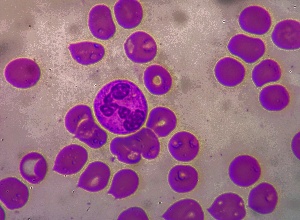Having abnormally small red blood cells – a condition known as microcytosis – is linked to more than double the risk of several cancers in a study of 12,000 UK men.
University of Exeter medical Sciences student Rhain Hopkins was lead author of the study of more than 12,000 UK patients aged over 40, which found that the cancer risk in males was 6.2%, compared to 2.7% in those without microcytosis.
The research, funded by Cancer Research UK and NIHR, found that in females, the risk of cancer was 2.7% in those with microcytosis, compared to 1.4% without.
Of more than 108,000 followed within the Clinical Practice Research Datalink records, 12,289 patients with microcytosis were followed up. Of those, 497 developed cancer within a year.
Microcytosis is related to iron deficiency and with genetic conditions which affect haemaglobin in the blood. Similarly, iron deficiency has been identified as a feature of some cancers, particularly colorectal. Microcytosis is easily identified in a routine blood test.
Hopkins was working with Exeter's cancer diagnosis team as part of her professional training year. As lead author of the paper, she said: "Research targeted at diagnosing cancer earlier is so important in reducing the burden of this devastating disease. The identification of risk markers, such as microcytosis, that are relevant to a range of cancers, can have a real impact in primary care. Being part of this research has been a very rewarding experience and getting my first paper published is such a massive achievement."
Professor Willie Hamilton, at the University of Exeter Medical School, who oversaw the research, said: "Overall, the risk of cancer in patients with microcytosis was still low, however our research indicates a need to investigate cancer. In two patients with cancer out of three the possibility of cancer is fairly easy to identify. For the other third, symptoms are often vague, and don't clearly point to cancer. For these patients GPs have to use more subtle clues to recognise that cancer may be present. Small red cells have long been recognised with colon cancer, but this study shows that they are a much broader clue, alerting the doctor to the small possibility of one of several possible cancers."
Abstract
Background: Microcytosis (smaller than normal red blood cells) has previously been identified as a possible early risk marker for some cancers. However, the role of microcytosis across all cancers has not been fully investigated.
Aim: To examine cancer incidence in a cohort of patients with microcytosis, with and without accompanying anaemia.
Design and setting: Cohort study of patients aged ≥40 years using UK primary care electronic patient records.
Method: The 1-year cancer incidence was compared between cohorts of patients with a mean red cell volume of <85 femtolitres (fL) (low) or 85–101 fL (normal). Further analyses examined sex, age group, cancer site, and haemoglobin values.
Results: Of 12 289 patients with microcytosis, 497 had a new cancer diagnosis within 1 year (4.0%, 95% confidence interval [CI] = 3.7 to 4.4), compared with 1465 of 73 150 without microcytosis (2.0%, CI = 1.9 to 2.1). In males, 298 out of 4800 with microcytosis were diagnosed with cancer (6.2%, CI = 5.5 to 6.9), compared with 940 out of 34 653 without (2.7%, CI = 2.5 to 2.9). In females with microcytosis, 199 out of 7489 were diagnosed with cancer (2.7%, CI = 2.3 to 3.1), compared with 525 out of 38 497 without (1.4%, CI = 1.3 to 1.5). In patients with microcytosis but normal haemoglobin, 86 out of 2637 males (3.3%, CI = 2.6 to 4.0) and 101 out of 5055 females (2.0%, CI = 1.6 to 2.4) were diagnosed with cancer.
Conclusion: Microcytosis is a predictor of underlying cancer even if haemoglobin is normal. Although a benign explanation is more likely, clinicians in primary care should consider simple testing for cancer on encountering unexplained microcytosis, particularly in males.
Authors
Rhian Hopkins, Sarah ER Bailey, William T Hamilton, Elizabeth A Shephard
[link url="https://www.sciencedaily.com/releases/2020/05/200505164635.htm"]University of Exeter material[/link]
[link url="https://bjgp.org/content/early/2020/05/04/bjgp20X709577"]British Journal of General Practice abstract[/link]

